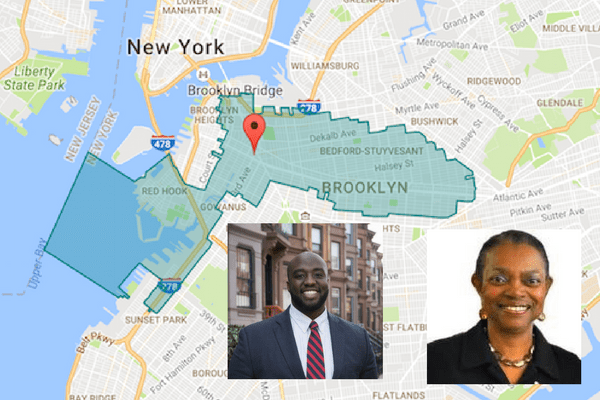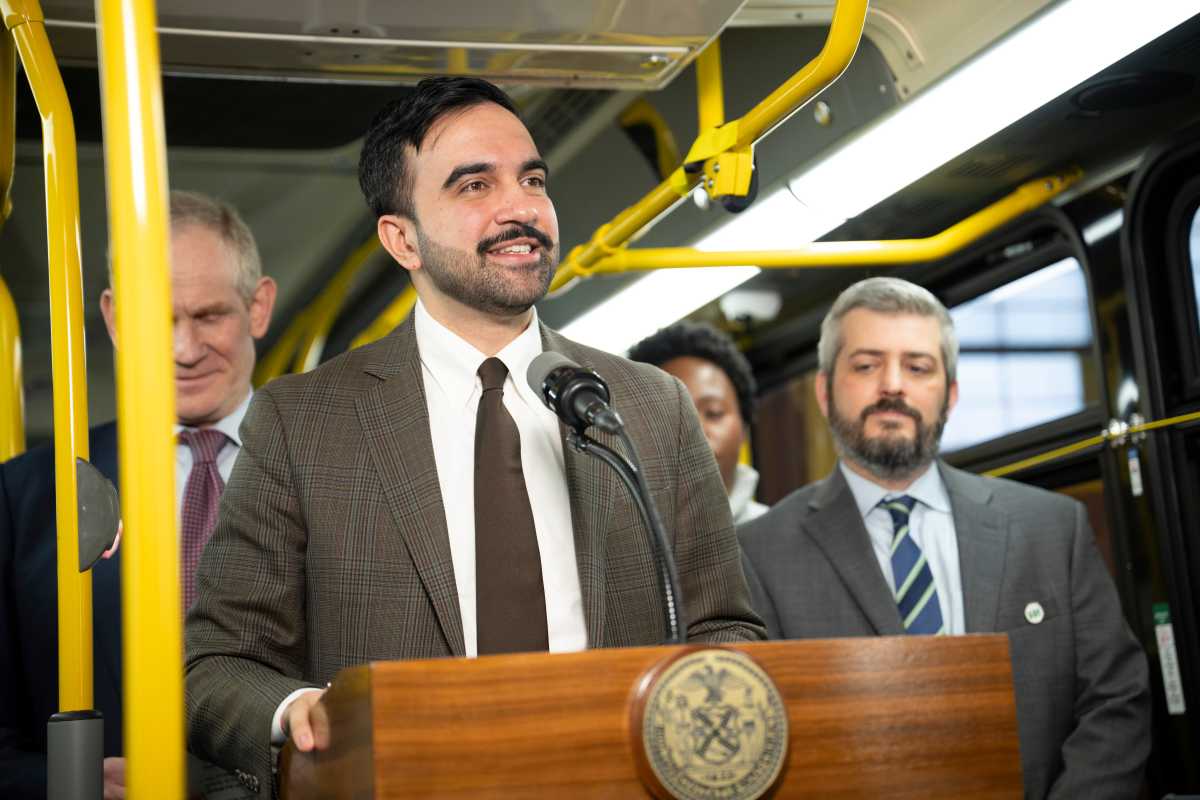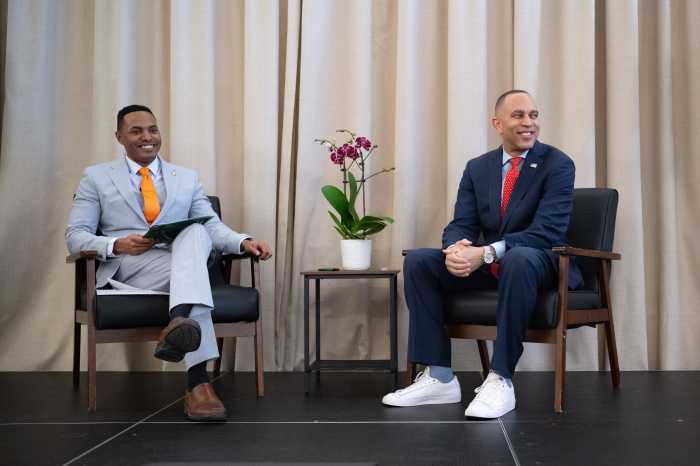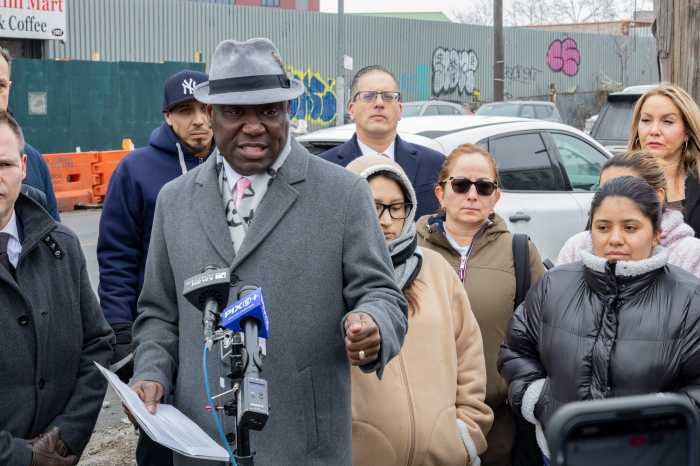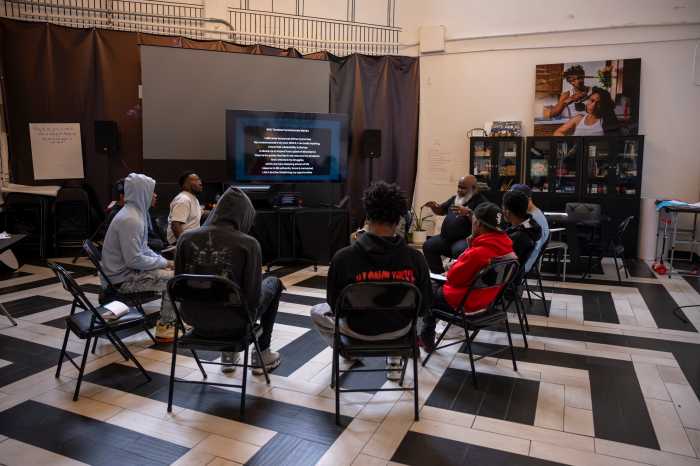EDITOR’S NOTE: As part of an on-going series, KCP is asking candidates running for state office in the upcoming Sept. 13 primary about issues of importance to their district and that are being debated in Albany.
In the 25th State Senatorial district, 32-year incumbent Velmanette Montgomery is facing challenger Michael Cox in the Democratic Primary in a district that includes the neighborhoods of Bedford-Stuyvesant, Fort Greene, Clinton Hill, Red Hook and parts of Brooklyn Heights, Boerum Hill, Sunset Park, Park Slope and Crown Heights.
Montgomery is one of Central Brooklyn’s most respected lawmakers and has wide institutional political support as the dean of Brooklyn’s senate delegation. She is currently the ranking Democrat on the Senate Committee on Children and Families.
Cox is among the new class of African-America millennials – young, educated and linked more to the possibilities of the future than the traditions of the past. Originally from Crown Heights, Cox graduated from Syracuse and worked as a public school teacher, and policy aide in both Congress and the Obama Administration.
KCP posed the following question to both candidates:
The 25th Senate District district includes a large portion of Downtown Brooklyn, including the Atlantic Yards project, which is a main economic engine for the borough. Additionally, several neighborhoods such as Bedford-Stuyvesant, Fort Greene, Clinton Hill, Red Hook and Boerum Hill have their own retail business districts and economic corridors.
What is your general economic policy for the district and these neighborhoods, and what type of ideas would you/do you pursue legislatively and thru constituent services to improve the economic climate in the district?

Michael Cox: “Senate District 25 includes the main economic engines within Brooklyn and yet some communities within the district have unemployment rates that are triple the national average and poverty rates well above 30%.
“Such disparity is unacceptable and is emblematic of politicians failing to successfully advocate for people or develop a plan that makes our local economy work for everyone—especially those most in need.
“While many people might focus on our national economic policy, I know—after serving President Obama as an Appointee in the U.S. Economic Development Administration—this is a matter of local leadership; My opponent has had 32 years to develop a local economic development plan and has not done so.
“The final two weeks of the election is not the time to hastily develop a plan and I once again call on Senator Montgomery to debate me anytime or anywhere within the district to discuss the local economy, her plan, my plan, and how we improve the financial condition of our communities.
“The foundation of my plan is the following:
- Create binding apprenticeship requirements that lead to JOBS for all projects that take tax credits–Brooklyn leads the United States in construction projects, yet residents are not benefiting from construction jobs. These construction projects, which take tax payer funding, must create a public benefit; and by ensuring job training accompanies each project we will make certain that Brooklyn residents acquire the skills they need to launch their careers.
- Provide local small business assistance and fight for 30% Minority & Women Owned Business contracting –we need to make sure we support small local businesses with technical assistance in securing government contracts and business-to-business deals. We also need to ensure that at least 30% of all City and State contracts—both construction and in the services sector—go to local and minority & women owned businesses.
- Fix the jobs—skills mismatch through education and career training – Over the next five to ten years, Industry City, Downtown Brooklyn, and the Brooklyn Navy Yard/Brooklyn Tech Triangle will see an influx of more than 50,000 new jobs—mostly high wage careers in the tech, advanced manufacturing, healthcare, and innovation sectors. These high wage jobs all fall within the Senate district and my opponent failed to plan for the first wave, which led to an influx of people from outside of Brooklyn taking these jobs while existing residents struggled to find a living wage.
- If elected, I will work with the higher education community to develop career pipelines and introduce legislation to create or modernize grant and scholarship programs to provide Brooklyn residents access to training for Tech, Construction, Healthcare, Entrepreneurship, and Advanced Manufacturing industries.
Fund the Brooklyn Economic Development Corporation (BEDC)—under the watch of my opponent, the BEDC—a 32 year not-for-profit that does economic development planning and advocacy—shut down because it was unable to receive consistent funding. Economic Development Corporations of this type work with Business Improvement Districts, smaller development corps, high schools, and higher education institutions to create and implement plans for broader economic growth.
- While our Brooklyn Chamber of Commerce has done a good job to support its members, a functioning BEDC could offer, comprehensive business consulting, financial assistance, and entrepreneur training programs for start-up and early-stage entrepreneurs—something sorely needed in creative communities who want to bring their talents and products to the marketplace but don’t possess the technical know how.
- We can achieve funding for the BEDC by introducing legislation to create micro economic development planning and implementation grants for communities. Through this process residents and community leaders will have a vehicle to advocate for jobs and local economic needs.
“Periodic Comprehensive Economic Development and Housing Plan’s–In the year 2000 and then again in 2006, the city released a report that said Brooklyn was on pace to grow to 2.7 Million residents. My opponent and many others failed to heed this warning and plan to absorb the increase in population. This resulted in a scarcity of housing amidst a rising population and an economy that added low wage jobs.
We can no longer fail to plan for our economic prosperity. If elected, I will ensure we conduct periodic, Comprehensive Economic Development Strategy (CEDS) plans. CEDS, are used by the Commerce Department, and Obama Administration officials to assess the business, education, transportation, infrastructure, and employment climate in order to determine how to catalyze equitable economic growth.
“A CEDS plan, coupled with a Housing Plan that takes into consideration population growth, will prevent unnecessary unemployment and allow our neighborhoods the chance to connect the dots between economic opportunity and reality. WE DESERVE A CEDS IN BROOKLYN.
- Host a Brooklyn Ideas Village Symposium to support innovation, entrepreneurship, and public-private partnership.
“If elected, I will host annual Brooklyn Ideas Village (BIV) symposiums to catalyze local entrepreneurship and public-private partnership focused on community improvement. Similar to the New Orleans Ideas Village, the BIV would bring together local business leaders, innovators, non-profit actors, and civic leaders to develop comprehensive solutions in our economy and community. This very intentional event will help cement the innovation and social entrepreneurial sectors in Brooklyn and extend opportunity to underserved populations.
“Based on my experience at NYU in Brooklyn, on the economic development committee of Community Board 2 and 8, and my work in government, I believe these measures would promote a more robust and opportunity laden economy in the 25 Senate District.
“These plans are long overdue and could have been implemented by my opponent at any point over the past 32 years but have not been. It’s time for leaders to be intentional about our economic growth and this plan does just that.”

Velmanette Montgomery: “As an elected official, it is important to think about economic development in a comprehensive way. Because I understand this, I have and continue to view economic development as an opportunity which should be available for many different constituencies.
“The future of our economy will depend, to a certain extent, on the development of industrial fields that are more innovative than ever and I recognize the potential for the 25th Senate District to play a major role in this. Consequently, I have put a lot of time and effort into organizing support for economic development, especially within the industrial waterfront areas in and bordering my district including Sunset Park, Red Hook and the Brooklyn Navy Yard.
“In order to accomplish this goal, I organized and hosted a coalition which we named the Brooklyn Waterfront Industrial/Economic Development Task Force to ensure that these efforts were done in a smart, inclusive and responsible way. Along with the Borough President’s office, my colleagues in the state, city and federal governments, Empire State Development (ESD) and nonprofit organizations including Fifth Avenue Committee (FAC), Pratt Center for Community Devlopment, Southwest Brooklyn Industrial Development Corporation (SWBIDC), IMPACCT, and Bedford Stuyvesant Restoration, we have worked towards a plan for waterfront development in a way that benefits constituencies in all parts of my district.
“Two additional economic development organizations that I work closely with are the Brooklyn Navy Yard Development Corporation (BNYDC) and Industry City. The Navy Yard now serves as a major manufacturing and technology hub that employs over 7,000 people, generates over $2 billion per year in economic impact for the city and houses over 330 businesses. Their employment center provide jobs and skills training, paid internships and with my assistance, employment opportunities for the previously incarcerated. I am proud to say that BNYDC surpasses most MWBE goals and makes it a point to target residents of the neighboring NYCHA developments for employment. They will also be hosting the unprecedented Smart Cities 2017 event which will turn the entire city into a canvas that highlights pioneering urban solutions from around the world.
“Industry City is a 35-acre hub of commerce and local employment along Sunset Park’s waterfront. It hosts workspace for a wide variety of industries and provides resources for youth, job seekers and future entrepreneurs.
“I also recently joined US Senator Kirsten Gillibrand in Manufacture New York, a woman-owned fashion design and production incubator in Sunset Park, to show my support for her Made in America Manufacturing Communities Act legislation which would prioritize local regions for receipt of funding to invest in manufacturing.
“Recognizing that Community Boards serve as the chief advocates on all issues that are important to the people who live and work in their communities, including economic development, I have introduced legislation(S1062) that would allow Community Boards located along coasts and waterways to apply for state funding to revitalize their waterfronts.
“I advocate for and support organizations in my district that provide vital economic resources to my constituents such as youth diversion and education programs. One of those is Brooklyn’s DREAMS YouthBuild, a comprehensive youth diversion program that focuses on education, job training and leadership development. The youth from this program often work on renovating affordable housing in their communities and receive licensing to work in construction. In order to ensure they always receive support from the state, I have introduced the NYS YouthBuild Act (S1749) which would provide a permanent funding stream ($20 million per year) for YouthBuild programs throughout New York State, half of which are in New York City.
“This year I also introduced legislation (S1568) to address barriers faced by MWBEs in state contracting by alleviating the burden of performance and payment bonds for MWBEs and increasing the accountability of the Division of Minority and Women Business Development. Furthermore it would create a mentor/protégé program to support the growth of MWBEs and address their specific concerns.
“I work tirelessly to direct state funding to my district and ensure that state agencies are responsive to the economic needs of my constituents and businesses with particular attention to organizations that have a proven commitment to producing tangible results. These include organizations that prioritize meeting high MWBE goals and provide quality employment and educational opportunities to the people I serve.
“This is just a snapshot into the latest work I have been doing to promote economic development throughout my district.”


